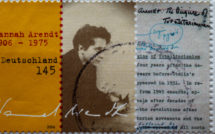

Kafka’s Son—what a captivating title! It translates well into any language. Additionally, it sends an instant message about the book’s subjects and dimensions: paying tribute to an unparalleled author in East Europe, capturing the complexities of the father-son relationship, tracking an author’s path in creative writing through space and time, all in a posthumous, unfinished novel placed in a Kafkaesque world. These were my initial thoughts when I first saw Szilárd Borbély’s novel Kafka fia eventually published in Hungarian in 2021, after the German translation entitled Kafkas Sohn appeared years ago.[1] The text certainly leaves the reader with the same feeling as a Kafka novel: although it has an ending, it feels as though it could be continued or expanded.[2]
The manuscript itself has been a legend since the author’s untimely death in 2014 by his own hand.[3] Borbély (1964–2014) started to work on this book several years before his debut novel Nincstelenek.[4] A string of seemingly fragmentary texts from his estate, Kafka’s Son is, partly, one of the author’s many attempts to deal with the tragedy of a lifetime through writing. In a brutal home invasion at his parents’ house in a small village in North East Hungary, his mother was bludgeoned to death in her bed at dawn on Christmas Eve of 2000. As survivor of that dreadful night, his father spent the next six years in total amnesia, lost to the world and locked in his own mind. The local police never solved the case, and the perpetrators have never been brought to justice.
For all the endeavors to follow strictly text-based interpretations, it is difficult, if not impossible, to avoid thinking about the author as a person behind Borbély’s texts. One cannot read the first volume of poetry entitled Halotti pompa (English: The Splendors of Death) he wrote after the events without noticing the mark left by the Christmas tragedy: the dedication to a female and a male name lists three dates, two of birth, one of death, according to the newspaper articles referenced in the Appendix.[5] Even though the fact is not clearly stated, even though Borbély only almost admits it, the couple in the news was his parents. After the book was published, acclaimed Hungarian author, translator, and critic László Márton wondered whether this fact would be absolutely necessary for the reader to know to better understand his poetry.[6] The new novel Kafka’s Son has likewise been considered, to some extent, a “coded autobiography,” where one should perhaps replace the names of Kafka’s parents with those of Borbély’s.[7]
There are pitfalls, however, in reading Borbély’s writing solely through the prism of these two great tragedies—the murder that shaped the course of his life and the suicide that brought it to a close. To be sure, several of his works are shaped by his mother’s death and father’s breakdown—a grief so profound that it spurred him to create a language of his own, comparable to none. However, as George Szirtes notes reviewing The Dispossesed, “there would be little of necessarily literary value in accounts of and reflections on a personal tragedy, unless the work amounted to something more.”[8] Reading Borbély’s work in the light of his suicide is even more fraught. As Beatrix Visy points out, this reinterpretation began in the obituaries, identifying certain elements in his texts as foreshadowing the end and often ignoring the distinction between the author and the narrator of his texts.[9] At worst, such readings can channel a collective sense of guilt for missing the warning signs into a too-easy narrative of redemption through posthumous appreciation, postponing the more rigorous critical approach that his texts deserve and demand.
Instead, Borbély’s texts encourage the reader to relinquish a mutually exclusive choice between biographical and purely textual interpretations. His own words turn out to be the best guide for orienting an interested reader in the role of personal tragedy in his writing process. In an interview about writing Halotti pompa, Borbély admits:
During the process I continuously felt that I was not writing, but that a greater force was carrying me, and I was just taking down notes from time to time. The ability to write is essentially a gift, just like all talents are. We see these cases where people become enslaved by their own talents, because talent is selfish and cruel. It is the manifestation of that greater force which moves your hand and moves people in general. This is how I ended up, against my will, presenting the bloody tragedy of my parents to the world, and ostensibly slipping into the position of one who pleads for commiseration.[10]
In advance of the forthcoming English version of Kafka’s Son, to be published by Seagull Books,[11] this article calls for Borbély’s assistance once again to take us closer to his works and better understand the author and his final novel, which he left incomplete but far from undeveloped or unrefined.[12] His own words are, as usual, the best guide, and the titles of the sections to follow all come from his published works.
Talent is cruel
After Communist rule came to an end in the region in 1989, Hungarian authors seem to have acquired more attention from publishers focusing on East Europe. Online literary outlets such as Asymptote, Europe Now, Hungarian Literature Online, and The Hungarian Quarterly (now discontinued) follow the literary output of contemporary Hungarian authors and share translated Hungarian works. One might wonder, however, whether English-speaking audiences who read works like Borbély’s in excellent translations fully appreciate the difficulties of rendering a Hungarian text authentically in a radically different language.
Spoken by about fifteen million people in the world, Hungarian is a member of the Uralic language family––more precisely, it is part of the Ugric branch of the Finno-Ugric group. As an agglutinative language, Hungarian uses suffixes and prefixes to express various changes in meaning or grammatical function, unlike English. The third-person singular personal pronoun does not differentiate gender. The alphabet with its forty-four letters includes digraphs and several vowels with accents and umlauts, which makes remembering, let alone pronouncing, Hungarian names extremely demanding and counterintuitive. Translating Hungarian prose or poetry, both with strong and idiosyncratic cultural traditions, poses a lot more challenges that those who have not tried it can hardly imagine.
As a small nation with a unique language for its region, Hungary traditionally, however, rushes to help aspiring international literary translators with opportunities offered by forward-looking groups of Hungarian authors or government entities. To mention a few, the legendary Attila József Circle of young (under forty-year-old) authors has been hosting Literary Translation Camps for decades at various locations, the Hungarian Translators’ House offers residencies in Balatonfüred at Lake Balaton, and the Balassi Institute has launched a ten-month Literary Translation Program,[13] all of them inviting translators from all over the world to add titles to their repertoire and more generally promoting a better understanding of the language and culture. In addition to joining a small but extraordinary network of peers, the interactions with Hungarian writers, poets, and critics, who often volunteer their time and teach seminars in these programs, provide a chance for translators to establish working relationships with authors that can prove vital in future translation efforts. At a minimum, the translator will feel empowered to contact the author, or, if necessary, consult with scholars and other specialists in contemporary Hungarian literature. These may turn out to be also the places and times of serendipitous discoveries as authors often voluntarily pass on details that might come handy later in the translation process.
Poet, writer, critic, and professor, memorialized at the Department of Hungarian Literature and Cultural Studies, University of Debrecen, Hungary, Szilárd Borbély himself taught poetry seminars for young authors and translators in these venues as well. [14] The connection between him and his English translator is palpable in all texts translated by Ottilie Mulzet. Having contacted authors routinely with text-related questions and queries, Mulzet points out in an interview that “even the way they choose to answer a question is so important.”[15] Mulzet’s interactions with the author might have been key to the level of contextual fidelity and textual accuracy to Borbély’s works, as well as to discovering paths that he might have approved using the language in his works to achieve the same effect in English, the target language.
Language is cruelest of all
Famous for constantly editing and reworking his text, Borbély would not submit anything for publication hastily or easily. Még bütykölök rajta kicsit, he would say.[16] “I’d rather play around with it a bit more” would be a decent translation in English, meaning that he would tinker with suffixes, swap sentences, or pick better words, with not much change in the overall meaning––but a slight difference can make all the difference in the world. For instance, one might spot a recurring phrase from his novel The Dispossesed about the child narrator sucking his thumb as a means of soothing himself after being scolded by the cold-hearted mother or dealing with a horrific event in his frigid, loveless family. The word in the Hungarian original is bütyök (English: knob, node, or bunion), used in the sense of thumb in the phrase Szopom a bütyköm, a universal solution to comfort himself. The connection between the two as coping mechanisms is clear in Hungarian but is probably lost in translation in most languages. Begun at a young age, the survival toolkit consists of family, friends, work, writing, and more, many of them assisting the narrator (like the author) to endure childhood trauma, the hopeless years under Communism, and the tragedy of his parents––if only temporarily.
Another challenging facet, not entirely unexpected but still shocking for readers as well as translators, is the brutality of Borbély’s language, with its graphic descriptions of various bodily functions and horrendous scenes as well as vulgar or offensive phrases. As used in everyday Hungarian with no religious or blasphemous overtone, God’s name is often invoked with obscenity, mostly as an expletive, indicating frustration or rage. However, he rarely calls up foul language or profanity unwarranted. As an example, dying, a central and recurring theme in his works, is a concept treated differently in Hungarian for people and for animals, expressed by two separate verbs: meghal (English: die, pass away) for human and megdöglik (die, from the stem dög, an animal carcass) for animal death. When in The Dispossesed the mother says that they would die in the village, Borbély chooses the one related to animals in Itt fogunk megdögleni––her desperation expressed by the verb choice is untranslatable in most languages. For a translator, having to ignore the occasional use would be quite a loss of nuance, while finding the right register in American English is a great achievement.
Only the language remains
If the poems in the sequences of Final Matters were dedicated to a mother-son relationship stemming from a mix of grief and perplexing incomprehension, and if The Dispossessed represents unfinished business between a mother and her son, Kafka’s Son continues the incompleteness between father and son in its fragments. Tackling the parent-child relationship in any of Borbély’s text will take the translator to an inevitable and more challenging distinction for the native English speaker, due to the complex, four-tiered system of addressing someone in the second person. For the simple concept of “you,” Hungarian has multiple options to use at various levels of politeness, including a rather formal third-person form (like usted/ustedes in Spanish when used in the manner of the French singular vous), i.e., addressing the second person grammatically in the third person. To complicate matters further, this has two versions: the commonly used Ön in official texts, which shows, to some extent, respect towards the person addressed; and Maga, which puts a certain distance between the speakers, such as in a supervisor-subordinate relationship, going both ways. Another formal, but more polite and affectionate way is to address someone as néni/bácsi (tetszikelés) and use the verb tetszik (“like”) as an auxiliary before the infinitive form of the verb, a sort of implicit “if you please” qualifying every action of the senior party. This is the way that children are taught to address adults. Traditionally, the elderly are also addressed in this form, and so are women by men.
The grammatical second-person “you” personal pronoun, Te, and related verb endings are used everywhere else where no special politeness is required, such as in close-knit families, among friends, colleagues, or peers, as well as by adults speaking to children. The use is similar to calling someone by their first name in English. Interestingly, the Te form is also used in religious contexts, to address God as well as in folk tales and children’s stories to address the highest rank such as a king. Additionally, all this affects verbs too. A special ending exists for the case when the subject is in the first person and the object is in this more intimate grammatical second person, such as in szeretlek (English: I love you), not to be found in a Borbély text.
To complicate matters even more, there’s the phenomenon of the so-called csendőrpertu. The word csendőr is archaic for a police officer, while pertu, from Latin per tu, suggests the use of the Te form both ways in a relationship. However, in combination, the phrase conveys a relationship in which one party is subordinated to the other: a low-level lab assistant to the chair of the department, for instance, or children and young adults to particularly strict or distant parents. In Borbély’s texts, all of the above will become significant and extremely hard to reproduce in another language. The author recalls that he was expected to use the third-person form with his parents, and, to avoid insulting them as they were very sensitive, he had to address them in the tetszik form.[17] Changing the pronouns and the verb forms in Hungarian sends a meaningful message, as the narrator explains the use of the second-person pronoun Te, rather than the formal Magaexpected by the father, to address the deceased father in the final part of Proteus at the Psychiatrist’s, masterfully translated with a workaround.
10b. Dedication
I never used the second-person singular with you when you were alive. Forgive me:
it isn’t from the lack of respect if I do so now. How can one speak to the dead with the formal courtesies of grammar Because
where there is no time there is no difference in age. Perhaps
only the language remains, the vanishing grammar of person
on the shore of the blurred sea of obligation.[18]
If you must go
Kafka’s Son reveals a lot about Borbély’s writing process, part of which is the thoroughness with which both Kafka and Borbély cultivated and applied the tools of the trade. His passion for writing doesn’t distract him; instead, the book depicts a disciplined writer, planning his work meticulously with abundant details, perhaps helping the translator too. In the novel the rabbi says that a story should be told in a manner that helps people.[19] From Borbély we also learn that “words give us instructions / as to what may be endured.”[20]
In terms of translating Borbély, one should remember Walter Benjamin’s enigmatic claim that the element of untranslatability in the text is exactly what constitutes its translatability: “The higher the level of a work, the more remains translatable even if its meaning is touched upon only fleetingly.”[21] Borbély’s texts accomplish this nearly unattainable goal in translation, as they remain capable of evoking universal feelings of grief, despair, and redemption in English.
In Kafka’s Son, the rabbi says Minden írás a semmibe vezet (English: All writing leads to nowhere). Revisiting the topic of personal pronouns one more time, one thinks of Esterházy’s narrator in Helping Verbs of the Heart, courting the possibility of personal annihilation in writing: “I write in the third person singular. It makes me feel safe. I hope I won’t die quite so soon.”[22] At some point, Borbély considered himself a “cultural migrant, who has to conceal traces leading to his past,” as he wrote in an essay about the lost language.[23] He claimed that the best thing about writing was hiding the “I” in the third-person texts, disappearing from the world, thus making the self vanish in a vacuum. The attempts of Borbély’s disappearing self to completely obliterate his tracks cannot help taking on a new pathos in light of his death.
Borbély’s disappearing act, intentionally hiding the self behind a name, can be traced back as early as the 1990s. In a conversation he suggested that he as an author was not the topic but rather just a name to which texts are attached, which are not him, just like the name doesn’t denote him. “The only convenience in literature is that there’s this name made for you, which makes it possible for you to disappear for a while.”[24] Has he succeeded? Has Kafka? By his request, Kafka’s unpublished manuscripts were supposed to be burnt to make the texts disappear. Instead, they became the author’s heritage, fascinating and puzzling readers ever since. What it means for Borbély to be posthumously published is yet to be fully understood. Kafka’s Son is with us and will stay with us, “a grave burden.”[25]
Meanwhile, the reader, the critic, the librarian, Hungarian or English-speaking, can’t wait to see another volume in the stacks, under the call number PH3213.B596 with the added date 2023, next to many of its predecessors that had inspired Borbély’s work: Walter Benjamin, Borges, Kafka, Kundera, and, per se, Szilárd Borbély.
Judit Hajnal Ward currently works as a librarian at Rutgers University. Born and raised in Hungary, she was a visiting professor of Hungarian Studies at Rutgers from 1999 to 2003. She received her doctoral degree in linguistics from the University of Debrecen, Hungary, and her MLIS at Rutgers. She is the author of three books: Tintásüveg [Ink well] (L’Harmattan, 2019), Nyitott könyvtár [Open libraries] (Kalligram, 2016), and Hungarian-English Phrasebook and Dictionary (Hippocrene Books, 2002). She has translated nine books from English to Hungarian. Her new book entitled Shelf Help: Handbook for the Accidental Bibliotherapist, coauthored with Nicholas Allred, is forthcoming in 2023 (ALA Editions).
References
Bedecs, László. “Egyszer láttam zsiráfot.” In: Beszélgetések kortárs költőkkel. [In Hungarian.] 2009.http://bedecs2.blogspot.com/2011/10/borbely-szilard-interju.html.) (English excerpt: Bedecs, László. An interview with Szilárd Borbély. Asymptote Journal. https://www.asymptotejournal.com/interview/an-interview-with-szilard-borbely/
Benjamin, Walter. “The Task of the Translator.” In Benjamin, Walter, Marcus Paul Bullock, Michael William. Jennings, Howard. Eiland, and Gary Smith. Selected Writings. 253–263. Cambridge, Mass: Belknap Press. 1996.
Borbély, Szilárd. “Egy konzervatív pesszimista.” A conversation between Sándor Mészáros and Szilárd Borbély. [In Hungarian.] Alföld 46. no. 8 (1995 August): 57–65.
Borbély, Szilárd. Halotti pompa. Bratislava: Kalligram. 2004.
Borbély, Szilárd. Berlin-Hamlet. Translated by Ottilie Mulzet. Prague: Agite/Fra, 2008
Borbély, Szilárd. “Az igazi nevem nem ismerem.” Szombat, February 19, 2009. An interview by Lucie Szymanowská and Kiss Szemán Róbert. [In Hungarian.] http://www.szombat.org/hirek-lapszemle/1035-az-igazi-nevem-nem-ismerem
Borbély, Szilárd. “Egy elveszett nyelv.” Élet és irodalom, July 5, 2013. [In Hungarian.] https://www.es.hu/cikk/2013-07-05/borbely-szilard/egy-elveszett-nyelv.html
Borbély, Szilárd. “To Patience.” Translated by Ottilie Mulzet. Asymptote Journal. January 2015. Retrieved from https://www.asymptotejournal.com/poetry/szilard-borbely-four-poems/
Borbély, Szilárd. The Dispossessed: A Novel. Translated by Ottilie Mulzet. New York: Harper Perennial. 2016.
Borbély, Szilárd. Kafkas Sohn. Berlin: Suhrkamp. 2017.
Borbély, Szilárd. Final Matters: Selected Poems, 2004-2010. (The Lockert Library of Poetry in Translation. Vol. 130). Translated by Ottilie Mulzet. Princeton: Princeton University Press. 2019.
Borbély, Szilárd. Kafka fia. Pécs: Jelenkor, 2021. ePub.
Borbély, Szilárd. In a Bucolic Land. New York: New York Review Books, 2022. Kindle.
Esterházy, Péter. Helping Verbs of the Heart. Budapest: Noran. [Bilingual ed.] 1990.
Forgách, András. “Franz és Szilárd. Afterword to Kafka fia.” In: Borbély, Szilárd. Kafka fia. Pécs: Jelenkor, 2021. ePub. 148-182. [In Hungarian.]
Kulathunga, Chamini. “English Has Its Own Music: A Conversation with Ottilie Mulzet.” Los Angeles Review of Books.August 4, 2020. https://lareviewofbooks.org/article/english-has-its-own-music-a-conversation-with-ottilie-mulzet/
Márton, László. “Visszájára fordítani. Borbély Szilárd: Halotti pompa.” Jelenkor 48, no 4 (2016 April): 390–397. [In Hungarian.] http://www.jelenkor.net/archivum/cikk/759/visszajara-forditani
Mészáros, Sándor. “Kafka fia. Borbély Szilárd (1964–2014).” Kalligram 23, no. 3–6. (2014 April) [In Hungarian.] http://www.kalligramoz.eu/Kalligram/Archivum/2014/XXIII.-evf.-2014.-aprilis/Kafka-fia
Schein, Gábor. Rettenetes súly. Élet és irodalom, August 13, 2021. [In Hungarian.] https://www.es.hu/cikk/2021-08-13/schein-gabor/rettenetes-suly.html
Száz, Pál. „Nagy és nehéz tudás” Borbély Szilárd Kafka fia című regényéről. Műút. January 20, 2022. [In Hungarian.] http://www.muut.hu/archivum/37875
Szirtes, George. “Deprivation: A Childhood in 1960s Hungary.” New York Times, November 25, 2016. https://www.nytimes.com/2016/11/25/books/review/szilard-borbely-dispossessed-berlin-hamlet.html
Visy, Beatrix. (2016). „Eltűnni csak.” A halál mint kánon- és kultuszformáló Borbély Szilárd életművében. Alföld 67, no. 12 (2016 December): 78–85. [In Hungarian.] https://epa.oszk.hu/00000/00002/00211/pdf/EPA00002_alfold_2016_12_078-085.pdf.
[1] Borbély, Kafka Fia (Pécs: Jelenkor, 2021); Borbély, Kafka’s Sohn (Berlin: Suhrkamp, 2017).
[2] Pál Száz, “’Nagy és nehéz tudás’ Borbély Szilárd Kafka fia című regényéről,” Műút (January 20, 2022), retrieved from http://www.muut.hu/archivum/37875.
[3] The concept of the book was born as early as the beginning of 2000s, when he was working on Berlin–Hamlet (Bratislava: Kalligram, 2008). A more intensive phase followed in the early 2010s. The manuscript, published as a book by Jelenkor in 2021 in its new Borbély series, was found in Borbély’s computer saved on December 9, 2013, including all parts, consolidated into a structure and consistent style according to the author’s instructions on the sequence of the texts. Gábor Schein, “Rettenetes súly,” Élet és irodalom (August 13, 2021), retrieved from https://www.es.hu/cikk/2021-08-13/schein-gabor/rettenetes-suly.html.
[4] Borbély, “Egy elveszett nyelv,” Élet és irodalom 57.27 (July 5, 2013) retrieved from https://www.es.hu/cikk/2013-07-05/borbely-szilard/egy-elveszett-nyelv.html
[5] Borbély, Halotti Pompa (Bratislava: Kalligram, 2004). Selections from Halotti Pompa and a subsequent collection, A Testhez (English: To the Body) were eventually translated and combined into an English volume entitled Final Matters (Princeton: Princeton University Press, 2019).
[6] Márton, “Visszájára fordítani. Borbély Szilárd: Halotti pompa,” Jelenkor 48.4 (April 2016): 390-7, retrieved from http://www.jelenkor.net/archivum/cikk/759/visszajara-forditani.
[7] András Forgách, “Franz és Szilárd. Afterword to Kafka fia,” in Borbély, Kafka Fia (Pécs: Jelenkor, 2021), 148-82.
[8] Szirtes, “Deprivation: A Childhood in 1960s Hungary,” New York Times (November 25, 2016), retrieved from https://www.nytimes.com/2016/11/25/books/review/szilard-borbely-dispossessed-berlin-hamlet.html.
[9] Visy, “’Eltűnni csak.’ A halál mint kánon-és kultuszformáló Borbély Szilárd életművében,” Altföld 67.12 (December 2016): 78-85, retrieved from https://epa.oszk.hu.00000/00002/00211/pdf/EPA00002_alfold_2016_12_078-085.pdf.
[10] László Bedecs, trans. Szabolcs László, “An Interview with Szilárd Borbély,” Asymptote Journal (2009), retrieved from https://www.asymptotejournal.com/interview/an-interview-with-szilard-borbely/
[11] Announcement by Borbély’s English translator, Ottilie Mulzet on her homepage at https://www.ottiliemulzet.net/szilard-borbely
[12] The text is said to be final as early as in 2014 and left to be published after his death, ironically, just like many of Kafka’s works. Close friend and publisher of many of Borbély’s works, Sándor Mészáros recalls in Borbély’s obituary that Borbély considered the publication of his volume of poetry, In a Bucolic Land (trans. Ottilie Mulzet [New York: New York Review of Books, 2022]) a priority to Kafka’s Son. Mészáros, “Kafka fia. Borbély Szilárd (1964-2014),” Kalligram 23.6 (April 2014), retrieved from http://www.kalligramoz.eu/Kalligram/Archivum/2014/XXIII.-evf.-2014.-aprilis/Kafka-fia.
[13] Their homepages are, respectively: József Attila Circle, http://jozsefattilakor.weebly.com/en.html;
Hungarian Translators’ House, https://www.transartists.org/en/air/hungarian-translators%C2%B4-house; and Literary Translation Program, https://balassischolarship.kormany.hu/literary-translation-programme
[14] Memorial to Szilárd Borbély on the homepage of the Department of Hungarian Literature and Cultural Studies, University of Debrecen. In Hungarian. Retrieved from https://irodalom.unideb.hu/hu/memoriam
[15] Chamini Kulathunga, “English Has Its Own Music: A Conversation with Ottilie Mulzet,” Los Angeles Review of Books (August 4, 2020), retrieved from https://lareviewofbooks.org/article/english-has-its-own-music-a-conversation-with-ottilie-mulzet/.
[16] Mészáros, “Kafka fia”
[17] Borbély, “Egy elveszett nyelv”
[18] Borbély, In a Bucolic Land, trans. Mulzet, 86.
[19] Borbély, Kafka fia, 32.
[20] Borbély, “To Patience,” trans. Ottilie Mulzet, Asymptote Journal (January 2015), retrieved from https://www.asymptotejournal.com/poetry/szilard-borbely-four-poems/.
[21] Benjamin, “The Task of the Translator,” trans. Harry Zohn, in Selected Writings, ed. Marcus Paul Bullock and Michael W. Jennings (Cambridge, MA: Belknap, 1996), I.253-63, at I.262.
[22] Péter Esterházy, Helping Verbs of the Heart, trans. Michael Henry Heim, bilingual ed. (Budapest: Noran, 1990), 75. Heim also translated Milan Kundera’s The Unbearable Lightness of Being.
[23] Borbély, “Egy elveszett nyelv”
[24] Borbély, “Egy konzervatív pesszimista”
[25] Schein, “Rettenetes súly”




